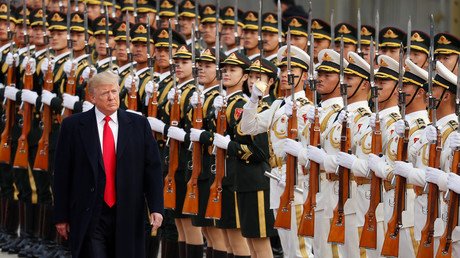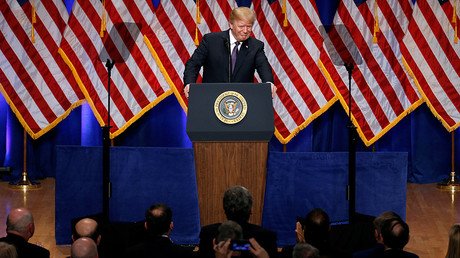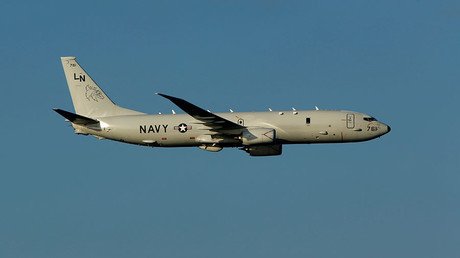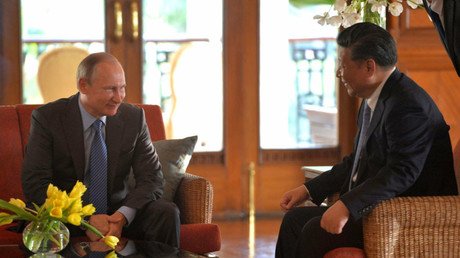'US will be doing its utmost to cause problems between Russia & China'
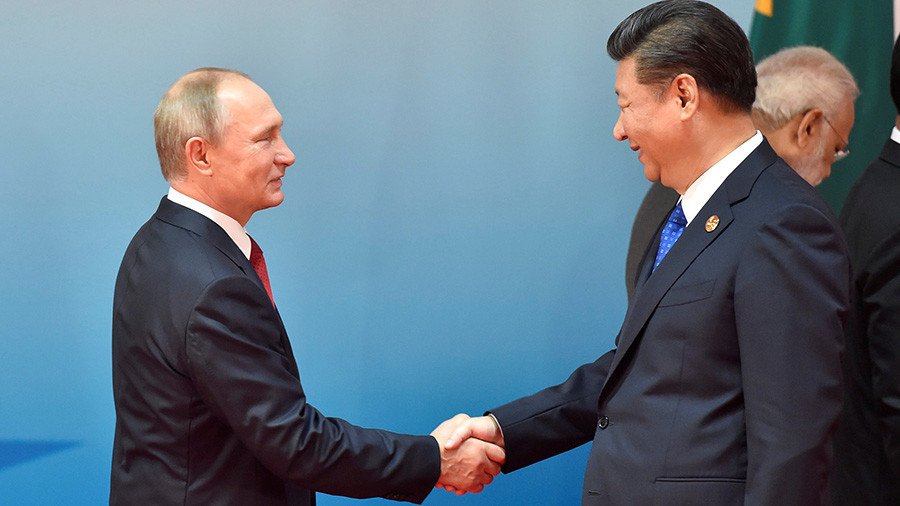
The ‘new’ security strategy is a justification for the US and its junior tool, NATO, to continue to up the ante and spend ever greater sums on maintaining tension in the world, says Prof William Mallinson, Marconi University.
US President Donald Trump outlined his view of the world and America's role in a new national security strategy.
According to the approach presented by the American president, “China and Russia challenge American power, influence, and interests, attempting to erode American security and prosperity.”
The two countries are also accused of developing advanced weapons that could threaten US infrastructure.
Beijing has branded Washington's approach as outdated.
“We urge the United States to stop deliberately distorting China’s strategic intentions, and abandon outdated concepts such as a Cold War mentality and a zero-sum game. Otherwise it will only harm everyone,” Chinese Foreign Ministry spokeswoman Hua Chunying told reporters on Tuesday.
President Trump’s announcement of a 68-page document outlining the US’ new security strategy is certainly not new, William Mallinson, Professor of Political Ideas and Institutions, at the University Guglielmo Marconi said in a comment to RT.
“It reflects the same tired old Cold War mentality so necessary to keep up the profits of the shareholders of the US military-industrial-congressional complex,” he said.
“Coming at the same time as an announcement the US will be spending over $200 million on upgrading facilities in Norway, Iceland, and Eastern Europe, it is clear that the ‘new’ security strategy is simply an opportunistic and specious justification for the US and its junior tool, NATO, to continue to up the ante and spend ever greater sums on maintaining tension in the world,” Mallinson added.
In his opinion, “some of the new colors of the old Cold War theme” are present in the new strategy. Those include “the introduction of four ‘pillars,’ namely protecting the homeland, promoting American prosperity, preserving peace through strength; and advancing American influence.”
“The first two pillars are obvious, and would be shared by any self-respecting country, while the second two are aggressive shades of exporting freedom, leading to geo-killing as a necessary part of geostrategy,” he said.
Mallinson, a former British diplomat, also said that “Trump’s bombastic election statements about ‘putting America first’ also reflect past immoderation of language” adding that any reading of past editions of Foreign Affairs “shows similar hegemonistic language.”
He recalled Madeleine Albright saying in 1998 “We are proud that America is not just another country, and we want our foreign policy to reflect our status as the globe’s leading champion of freedom.”
“Some years later, Bush senior said: ‘Our cause is just, our cause is moral, our cause is right.’ This kind of bombast appeals to an enormous swathe of parochial ‘Middle America.’ Trump is indeed appealing to much of Middle America and the Bible-belt, which lap up this kind of simplistic, jejune and sloganized language. We are again seeing the rise of posture politics, with an added element of pseudo-machoism, the result perhaps of the failure of the US – and of course Israel– to get its way in the Middle East. And we are seeing a resumption of Kennan’s so-called ‘containment policy’; of the Truman doctrine; and of McCarthyism: the same obsessions in new colors,” Mallinson said.
READ MORE: 'Why don’t we talk to people before we use sanctions & bombs?’ – Ron Paul
“This latest outburst also reflects the US’ failure to divide Russia and China. Although Margaret Thatcher praised Kissinger for having detached China from the Soviet Union, describing it as a “crucial element of victory” in the Cold War, this did not last long, and we are currently witnessing an inexorable move away from the dollar thanks to a recognition by Russia and China that the US is the main threat to world peace and stability,” he added.
The former diplomat added that we can be certain that Washington “will be doing its utmost to cause what problems it can between Russia and China.”
“At the moment any efforts to do so would, however, look silly, since the US is threatening China in the China Sea, and Russia through the enormous build-up of NATO on her western borders,” he said. “This latest outburst perhaps reflects a weakening of US power: the bark is becoming louder, but is not matched by the bite.”
‘The US needs enemies’
Joseph Cheng, professor of political science at Hong Kong City University, told RT that “the US needs enemies or - to put it more nicely - strategic competitors.”
In his opinion, they are needed for the US “to remain on the alert and to be able to muster enough resources to maintain a lead.” Moscow and Beijing understand this, he added.
Cheng’s went on to say that “the Donald Trump administration is less concerned with human rights issues… but in its first defense budget, it has increased its expenditure by almost 10 percent.”
“And it is certainly very eager to secure economic concessions from its major trading partners, meaning more jobs for the Americans, less trade deficit, more investment throwing into the US..,” he continued.
Asked about China’s role in Trump's national security plan, Cheng said that the White House, like most Americans, considers China its most serious and important potential competitor in the future.
“It is suspicious of China exactly because it is not seen as a democratic country, not seen to be supporting…universal values. Even when Japan posed an economic challenge to the US in the 1980s, it received very substantial pressure from the US,” he added.
“The Chinese leadership responses in saying that it would like to have a new type of major power relationship with the US meaning no major confrontations, no major challenges. They try to contain the differences by trying to promote mutual interests. Apparently, this approach has not been working very well,” Cheng concluded.
